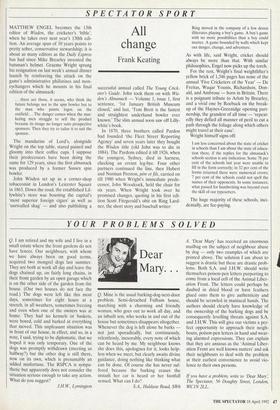SPECTATOR SPORT
All change
Frank Keating
MATTHEW ENGEL becomes the 13th editor of Wisden, the cricketer's 'bible', when he takes over next year's 130th edi- tion. An average span of 10 years points to pretty sober, conservative stewardship; it is about as many editors as the Daily Express has had since Mike Brearley invented the batsman's helmet. Graeme Wright sprung his resignation on last week's annual dinner launch by reinforcing the attack on the game's administrative philistines and mon- eychangers which he mounts in his final edition of the almanack:
... there are those, it seems, who think the future belongs not to the spin bowler but to the man who paints logos on the outfield ... The danger comes when the mar- keting men struggle to sell the product because its image no longer suits prospective sponsors. Then they try to tailor it to suit the sponsor.
The mandarins of Lord's, alongside Wright on the top table, stared pained and gloomy into their coffee cups. I suppose their predecessors have been doing the same for 129 years, since the first almanack was produced by a former Sussex spin bowler.
John Wisden set up as a corner-shop tobacconist in London's Leicester Square in 1863. Down the road, the established Lil- lywhite's store was boasting the capital's `most superior foreign cigars' as well as `unrivalled shag' — and also publishing a
successful annual called The Young Crick- eter's Guide. John took them on with Wis- den's Almanack — Volume 1, issue 1, first sentence, '1st January British Museum closed,' and last, 'Tom Brett is the fastest and straightest underhand bowler ever known.' The slim annual soon saw off Lilly- white's book.
In 1870, Three brothers called Pardon had founded 'the Fleet Street Reporting Agency' and seven years later they bought the Wisden title (old John was to die in 1884). The Pardons edited it till 1926, when the youngest, Sydney, died in harness, checking an errant leg-bye. Four other partners continued the line, then Hubert and Norman Preston, pere et fils, carried on till 1980 when Wright's immediate prede- cessor, John Woodcock, held the chair for six years. When Wright took over he promised changes, quoting in his first edi- tion Scott Fitzgerald's obit on Ring Lard- ner, the short story and baseball writer:
Ring moved in the company of a few dozen illiterates playing a boy's game. A boy's game with no more possibilities than a boy could muster. A game bounded by walls which kept out danger, change, and adventure.
As with life, said Wright, cricket should always be more than that. With similar philosophies, Engel now picks up the torch.
For the rest, Wright's final weightlifter's yellow brick of 1,346 pages has none of the annual 'Five Cricketers of the Year' — De Freitas, Waqar Younis, Richardson, Don- ald, and Ambrose — born in Britain. There is a poignant tribute to Arlott by Brearley, and a vivid one by Roebuck on the break- up of the Haynes-Greenidge opening part- nership, the grandest of all time — 'repeat- edly they defied all manner of peril to cut a path through the foliage along which others might travel at their ease'.
Wright himself signs off:
I am less concerned about the state of cricket in schools than I am about the state of educa- tion there, if the replies for the almanack's schools section is any indication. Some 78 per cent of the schools last year were unable to fill in the form correctly; in 32 per cent of the forms returned there were numerical errors; 7 per cent of the schools could not spell the names of their opponents. In some instances, what passed for handwriting was beyond even the skill of our typesetters.
The huge majority of these schools, inci- dentally, are fee-paying.


















































 Previous page
Previous page